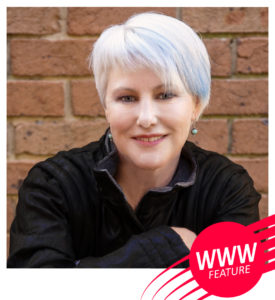WWW FEATURE: Wendy Young
Womenize! Wednesday Weekly is our weekly series featuring inspirational women from games and tech. For this edition we talked to Wendy Young. In her position as Business and Executive Coach at Blue Raven, she helps game studios succeed on many levels. Read more about Wendy in this interview:
 Hi Wendy! You are a professional coach, supporting Indie Game Developers in Australia and all over the world. Could you give us some insights into what your work is about?
Hi Wendy! You are a professional coach, supporting Indie Game Developers in Australia and all over the world. Could you give us some insights into what your work is about?
In a nutshell, we help game studios succeed. What that entails depends on the studio, their particular challenges and their goals. For startups the focus tends to be on establishing basic business practices and creating an alignment between the intentions of all the people involved. Having clarity of direction and intention is really important for making decisions that serve the studio. Established studios often have business processes that are serving them, though they will need to adjust as they scale. The challenges at this level tend to be more about managing and leading people, and fostering a great culture. While it’s possible to function, to an extent, with poor leadership skills and a toxic culture, it can creep up on you and doesn’t end well. No one sets out to create that kind of environment, so being proactive in designing and maintaining the culture of the studio is its own reward. Other benefits include attracting and retaining great staff, and having a low internal cost to being in business. These costs tend to be invisible until a problem is solved and then it’s easy to look back and say, “if we’d done this sooner, this and this would have been different”. Whatever the challenge, the first step is always a conversation, and sometimes awareness is enough for people to resolve a challenge.
With your broad background in Arts and Technology, as well as traditional Project Management, why did you decide to move into the gaming industry sector?
I love the games industry. I love the creative/technical crossover that is normal here, and I love the commitment of developers/creators to their craft. I’ve had a pretty diverse career from researching in linguistics to business analysis to scrum master to my first small business venture, which was a photographic gallery (An unsuccessful photographic gallery, and boy did I learn a lot!) to mother to coach. I feel like all of these disparate experiences have led to this place where I have an ideal skill set to bring to an industry that often isn’t used to thinking of itself in terms of business and has a whole set of challenges that can seem insurmountable from inside while being resolvable with a new perspective and some different skills. I believe that creative people make the world a richer place and that I can help to ensure that their contribution is sustainable and rewarding. I’m always fascinated to see what comes next.
In your opinion, what are the biggest common challenges that Indie Game Devs nowadays find themselves faced with, in order to become successful?
The challenges at different levels in the industry vary. For indie startups, the challenge they think they have is funding: How to have enough money to make their game. This is definitely a problem, especially in Australia where there is very limited funding support for the industry. However, I believe there is a bigger challenge that is often ignored which is: Who is going to play your game? For startups it is pretty common to spend a considerable amount of time making a game before thinking about who would play it. This isn’t a problem if you are a hobbyist or if your motivation is to make ‘that one game’ you’ve always wanted to make without caring about whether it, or your studio, are successful. It’s a very big problem if you are planning on having a successful business. Spending a heap of time making something without any real idea of who would want it is a loaded dice roll, and highly unrecommended from a business success point of view. If you want to have a successful game you must do market research, and it needs to be done up front because the common solution of “we’ll pay to market it” will be a waste of money unless you know who wants it, where they are, and how to tell them about it in a way that resonates with them. Assuming the game is successful, the next challenge is how to stay successful which sounds easy, but there is nothing quite like success to put both relationships, and flimsy systems and processes under strain. Basic business skills are often lacking in a startup because the studio is being used as a place to house the effort of making the game. I believe it’s important to establish as much business infrastructure as necessary, and no more. And be willing to add to the complexity as and when needed. The most important conversation to begin with is around ownership and equity. I generally recommend a dynamic equity split and I suggest that if team members are uncomfortable having a frank conversation about finance, effort and IP, success is going to be very challenging and potentially relationship destroying. Culture is created in both the big conversations and in the day to day minutia of working together. Being proactive in creating a great place to live and work is, I would say, essential to long term success.
Thank you for your time, Wendy!
Wendy’s Links: Wendy’s LinkedIn | Wendy’s Twitter
WWW Feature by Sophie Brügmann

